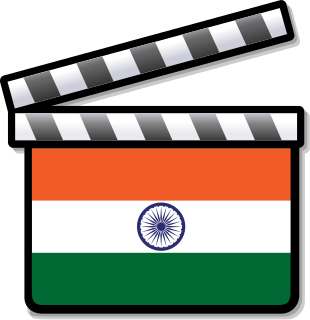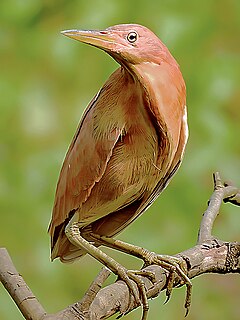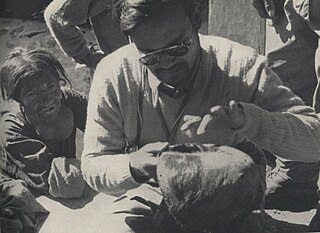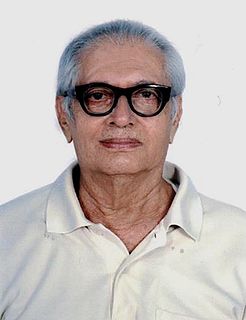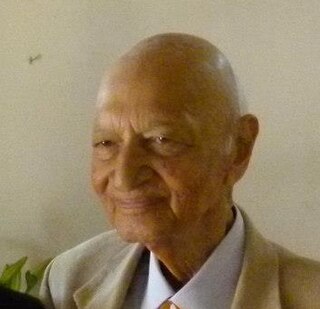The Book of Indian Birds by Salim Ali is a landmark book on Indian ornithology, which helped spark popular interest in the birds of India. [1] First published in 1941, it is currently in its 13th edition. Most of the older books on Indian birds were meant for identification using specimens in the hand and the only other field guide, Hugh Whistler's Popular Handbook Of Indian Birds was published in London, was getting out of date and not readily available in India. The book of Indian birds provided a popular bird-guide in a low-cost edition.

Sálim Moizuddin Abdul Ali was an Indian ornithologist and naturalist. Sometimes referred to as the "Birdman of India", Salim Ali was the first Indian to conduct systematic bird surveys across India and wrote several bird books that popularized ornithology in India. He became a key figure behind the Bombay Natural History Society after 1947 and used his personal influence to garner government support for the organisation, create the Bharatpur bird sanctuary and prevent the destruction of what is now the Silent Valley National Park. Along with Sidney Dillon Ripley he wrote the landmark ten volume Handbook of the Birds of India and Pakistan, a second edition of which was completed after his death. He was awarded the Padma Bhushan in 1958 and the Padma Vibhushan in 1976, India's third and second highest civilian honours respectively. Several species of birds, a couple of bird sanctuaries and institutions have been named after him.

India, also known as the Republic of India, is a country in South Asia. It is the seventh largest country by area and with more than 1.3 billion people, it is the second most populous country as well as the most populous democracy in the world. Bounded by the Indian Ocean on the south, the Arabian Sea on the southwest, and the Bay of Bengal on the southeast, it shares land borders with Pakistan to the west; China, Nepal, and Bhutan to the northeast; and Bangladesh and Myanmar to the east. In the Indian Ocean, India is in the vicinity of Sri Lanka and the Maldives, while its Andaman and Nicobar Islands share a maritime border with Thailand and Indonesia.

Ornithology is a branch of zoology that concerns the study of birds. Several aspects of ornithology differ from related disciplines, due partly to the high visibility and the aesthetic appeal of birds.
The J. Paul Getty Award for Conservation Leadership, while awarding Salim Ali in 1976, said in its citation:
The J. Paul Getty Award for Conservation Leadership has been awarded annually since 2006 in recognition of outstanding leadership in global conservation. The award aims to acknowledge individuals making "pioneering and substantial" contributions to conservation as well as foster the development of future leaders in conservation. The $200,000 cash award goes to fund graduate fellowships for students in conservation-related fields. These fellowships are established at the institution of higher learning of the awardee's choice and named in honor of the award recipient and J. Paul Getty.
- ... your book, the Book of Indian Birds which in its way was the seminal natural history volume for everyone in India.[ citation needed ]
Among the early converts of the book was Jawaharlal Nehru, who was to become India's first prime minister. While in jail under the British Raj, he gave a copy to his 25-year-old daughter Indira Gandhi.[ citation needed ]

Pt. Jawaharlal Nehru was a freedom fighter, the first Prime Minister of India and a central figure in Indian politics before and after independence. He emerged as an eminent leader of the Indian independence movement under the tutelage of Mahatma Gandhi and served India as Prime Minister from its establishment as an independent nation in 1947 until his death in 1964. He is considered to be the architect of the modern Indian nation-state: a sovereign, socialist, secular, and democratic republic. He was also known as Pandit Nehru due to his roots with the Kashmiri Pandit community while Indian children knew him as Chacha Nehru.

A prime minister is the head of a cabinet and the leader of the ministers in the executive branch of government, often in a parliamentary or semi-presidential system. A prime minister is not a head of state or chief executive officer of their respective nation, rather they are a head of government, serving typically under a monarch in a hybrid of aristocratic and democratic government forms.

The British Raj was the rule by the British Crown in the Indian subcontinent from 1858 to 1947. The rule is also called Crown rule in India, or direct rule in India. The region under British control was commonly called British India or simply India in contemporaneous usage, and included areas directly administered by the United Kingdom, which were collectively called British India, and those ruled by indigenous rulers, but under British tutelage or paramountcy, and called the princely states. The whole was also informally called the Indian Empire. As India, it was a founding member of the League of Nations, a participating nation in the Summer Olympics in 1900, 1920, 1928, 1932, and 1936, and a founding member of the United Nations in San Francisco in 1945.
The second edition of the book was published in 1942, subsequent editions being in 1944, 1945, 1961, 1964, 1968, 1972, 1977, 1979 (11th edition with reprints in 1984, 1986, 1988, 1990 and 1992), 1996 (12th edition) and 2002 (13th edition).
